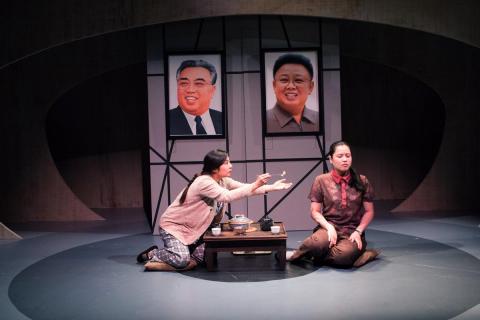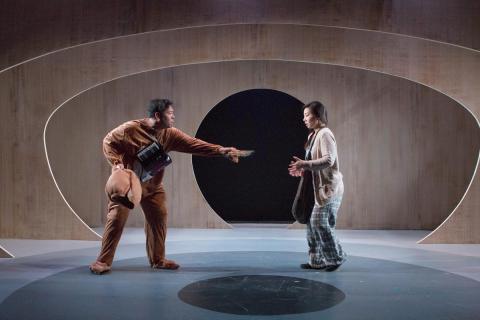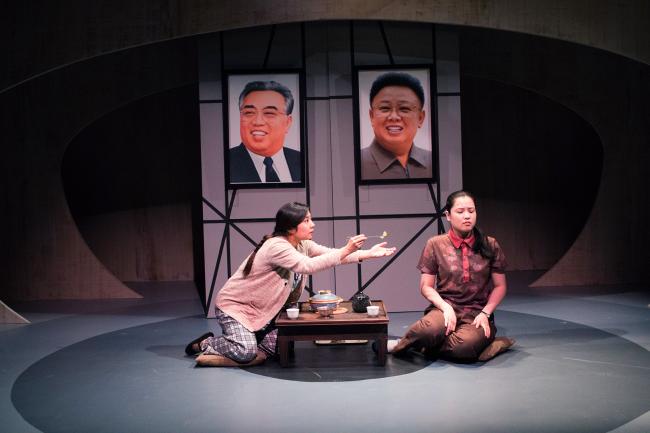R. Eric Thomas' Theatre Date - YOU FOR ME FOR YOU with Andrew Panebianco
We start off talking about mementos. Andrew Panebianco is telling me about a new knicknack he’s recently acquired, a bowl. It belonged to someone he liked a lot; he’s looking forward to keeping it around for the sake of sentimentality. We’re sitting in The Drake, waiting for InterAct’s You For Me For You to begin. And we’re talking about mementos--what things you hold on to, what things you leave behind.

Andrew is one of my dearest friends in Philadelphia and I’ve asked him to accompany me on this, my first Theatre Philadelphia “Theatre Date” because he’s a great conversationalist, a witty wordsmith, a great storyteller and game for an adventure. This is a project the shape of which is still a mystery to me. The premise is simple: I’ll go to shows with Philadelphians who are integral parts of city life but not directly connected to the theatre community. We’ll then talk about whatever the play brings up for us and I’ll, in some form or another, report back to you. The idea is that theater always sparks a conversation. A lot of time we in the theater community have a very particular set of conversations--about performances, about dramaturgy, about theater gossip and politics. But we make theater for people to have a whole other set of conversations. I’m curious what those are. I’m curious what people take with them after the lights come up. And what they leave behind.
And so we’re talking about mementos, apropos of nothing. I tell him that it’s no wonder he and my husband get along so well; they would both live in houses filled floor to ceiling with reminders of the past if they could, personifying all the best qualities of the Wingfields. Me, I’m slouching toward minimalism. I bought The Life-Changing Magic of Tidying Up but I haven’t read it yet. Andrew asks me why I don’t hold onto things. I tell him it’s because all of my middle and high school souvenirs were run over by a car. Which is true, but that’s a story for another time.
The conversation moves on. He tells me about running into Katherine Fritz a few days after the election. They gave each other big hugs. “I’m really glad to see you,” she said. I’m brought back to how sad and how terrifying those days were, at least for me. I marvel a little at how those feelings have dulled with time. Dulled but not gone away.
It’s tempting to draw parallels between our present political situation and the brutal authoritarian regime that Mia Chung so vividly captures in You For Me For You, but no matter how sinister our leaders are, any comparison would be hyperbole. So dire are the conditions in which North Korean sisters Minhee (Bi Jean Ngo) and Junhee (Mina Kawahara) find themselves that it’s all but incomprehensible. Andrew marveled, after the show, at the angle that Minhee kept her body throughout, constantly showing deference even when there was no one to whom to defer. Junhee is constantly policing herself, echoing the dictates of the regime. At one point, one sister laments “I can’t be sure my thoughts are my own.” The subjugation exists in their bones, in their flesh.

The play is a magical realist tale about (minor spoilers ahead) the sisters’ attempted escape from North Korea after Minhee’s son has been sent to away for reeducation and her husband, a government official, has been disappeared. They’re separated at the border; Junhee makes it, Minhee doesn’t. The younger sister manages to get to America, where we watch her learn English through a series of brilliantly-written and acted vignettes with Hillary Parker. Time speeds up for her. Outside of North Korea, the play posits, time moves faster, ever-increasing, ever-progressing. Inside, time stands still. As years fly by for Junhee, her older sister remains stuck in a well she’s fallen into. Perhaps stuck, also, in a moment in time, she embarks on an Alice in Wonderland-esque journey, encountering a series of mysterious figures played by the magnificent Justin Jain. Each one is as cryptic as a Cheshire Cat and as mercurial as the Red Queen, a reflection of the state’s iron hand.
As Minhee travels the world of the well, she accumulates items imbued with meaning. Junhee, meanwhile, is surrounded by things in America--things to buy, things to do--but she repeatedly restricts her enjoyment of them.

Flung out into their separate quests, the sisters rarely mention each other, but it’s clear they are inextricably tethered. Though they are in separate worlds--one democratic, one magical--they are always also in North Korea. Andrew noted after the show that Melpomene Katakalos’ set places the performers in the middle of a giant iris. Observation is both implicit and explicit. Someone is constantly watching; someone is constantly looking in. And someone is constantly looking out. Vision is the only thing that these women have.
We end our night talking about the privilege of sentimentality, of having something to hold onto. We are taught that we can imagine anything and then go out and get it. We fill ourselves not with our eyes but with our hands. It’s hard to say this is a bad thing. It certainly feels like the nature of freedom. We surround ourselves with the people we care about, and in their absence, the things that remind us of them. We get to constantly exist in the past, the present and the future. We have the right to leave nothing behind.
You For Me For You by Mia Chung, directed by Rick Shiomi, is produced by InterAct Theater Company. It opened on March 29 and runs through April 16. Find tickets and more information at interact.org
R. Eric Thomas is an award-winning playwright and humorist. His most recent play, Time Is On Our Side, was the recipient of two Barrymore Awards including Best New Play and was named a finalist for the Harold and Mimi Steinberg American Theatre Critics Association New Play Award. He writes a daily humor column for ELLE.com in which he “reads” the news. In addition to ELLE.com and ELLE magazine, his writing has appeared in W, Man Repeller, the Philadelphia Inquirer, Philadelphia Magazine and more. rericthomas.com

